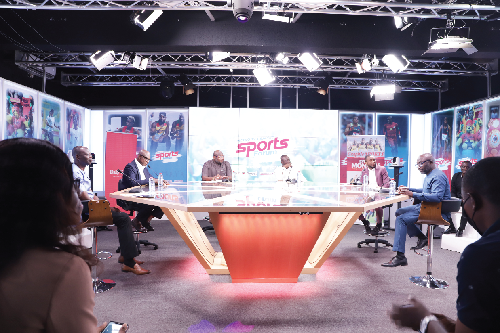
Metro TV-Graphic Sports Forum...Unlicensed coaches ‘hot’, cannot handle clubs — GFA
The Ghana Football Association (GFA) says it is aggressively building the capacity of coaches in the country in line with its Club Licensing Regulations to help raise the standard of the local game.
According to the GFA General Secretary, Mr Prosper Harrison Addo, the association was working with a plan to ensure that in the next few years, no untrained and unlicensed coach will be allowed to handle any league club in Ghana, including teams at the juvenile level.
Mr Addo revealed at the maiden Metro TV-Graphic Sports Forum held in Accra last Tuesday that Ghana currently lacked a lot of trained and licensed coaches at the lower levels of football for which the FA was aggressively tackling the issue with a number of training programmes at the FA's development centre at Prampram.
![]()
Mr Mawuko Afadzinu (3rd right), Ghana Tabble Tennis Association President, contributing to the discussion at the event
Club licensing pillars
Club licensing is one of the tools we are using to change the game. We have new regulations and it covers infrastructure, sporting, legal, administration and personnel issues.
"Coaching is very key and the plan is that no club in Ghana will play without trained and licensed coaches, and we are stretching it down to the juvenile level," he said.
The GFA's chief administrator said the FA appointed Prof. Joseph Kwame Mintah as its Director of Coaching Education to oversee the training of coaches at all levels, in collaboration with the FA's Technical Director, Mr Berhnard Lippert and the UEFA assist programme.
In the last three weeks, the FA run refresher courses for CAF License A and CAF License B holders to build their capacity ahead of the new season.
Explaining further, he indicated that a few changes had been made to the Club Licensing Regulations in line with new directives by CAF, to ensure that only CAF License A holders or those with higher equivalent from Europe or South America were allowed to handle Ghana Premier League clubs as head coaches or as assistant coaches respectively.
Last Tuesday’s programme was held on the theme 'State of Ghana Sports: Challenges and the Future'. It was moderated by the GFA Executive Council Member, Dr Randy Abbey and involved a panel of experts and key stakeholders who deliberated on the state of athletics, boxing and football and provided solutions to the challenges affecting the growth of these disciplines.
Capacity building
Lack of capacity in top level coaching was not restricted to football. Track and field and boxing faced similar challenges with representatives of these associations and federations stressing the need to ensure that those charged with talent development were adequately trained and licensed.
The Communications Director of the Ghana Boxing Authority (GBA), Alhaji Mohammed Amin-Lamptey, admitted that capacity building for boxing trainers was very essential since many of the men developing talents were volunteers without the requisite training and license.
"We need no develop a modern licensing regime for our coaches because we have not organised courses for boxing trainers in a long time. Currently, there is no proper roadmap for that," he admitted.
Mr Alex Ntiamoah-Boakye, a boxing promoter, said that apart from the need to seriously build the capacities of personnel involved in the training and development of boxers, the base of the sport was weak and required a lot of attention in the areas of infrastructure.
He said a recent advice by boxing icon Azumah Nelson to Olympic Games bronze medallist, Samuel Takyi, to relocate to the USA because the youngster did not have a bright future in Ghana underscored the present reality that in many ways, the country did not have the right environment to develop boxers to their full potential.
Support for athletics
The CEO of the Ghana Athletics Association (GAA), Mr Bawah Fuseini, also underscored the need for support from the government and corporate investors to build the capacities of track and field coaches currently training athletes in Ghana.
He acknowledged the GAA’s good development plans on paper but needed funding for their implementation, including the development of top coaches.
"Ghana has an abundance of youth and development coaches but we don't have elite coaches.
Most of our coaches are former athletes who went into coaching after receiving basic or no training. At a stage, some athletes outgrow their coaches here," Mr Fuseini said.
